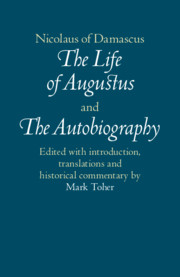 Nicolaus of Damascus: The Life of Augustus and The Autobiography
Nicolaus of Damascus: The Life of Augustus and The Autobiography Book contents
- Frontmatter
- Dedication
- Contents
- Preface
- Note on the Text
- Introduction
- TEXT AND TRANSLATION OF THE LIFE OF AUGUSTUS
- COMMENTARY
- TEXT AND TRANSLATION OF AUTOBIOGRAPHICAL EXCERPTS
- SIGLA
- NICOLAUS OF DAMASCUS: AUTOBIOGRAPHICAL EXCERPTS
- COMMENTARY
- References: Abbreviations
- Editions Of The Bios Kaisaros And Idios Bios
- General Index
- Index of Greek Words
NICOLAUS OF DAMASCUS: AUTOBIOGRAPHICAL EXCERPTS
from TEXT AND TRANSLATION OF AUTOBIOGRAPHICAL EXCERPTS
Published online by Cambridge University Press: 11 May 2017
- Frontmatter
- Dedication
- Contents
- Preface
- Note on the Text
- Introduction
- TEXT AND TRANSLATION OF THE LIFE OF AUGUSTUS
- COMMENTARY
- TEXT AND TRANSLATION OF AUTOBIOGRAPHICAL EXCERPTS
- SIGLA
- NICOLAUS OF DAMASCUS: AUTOBIOGRAPHICAL EXCERPTS
- COMMENTARY
- References: Abbreviations
- Editions Of The Bios Kaisaros And Idios Bios
- General Index
- Index of Greek Words
Summary
About his Private Life and Education
SUDA
Ex. 1: Antipater: The father of Nicolaus of Damascus the historian, who took Stratonice, the mother of Nicolaus, as his wife. The family was famous in Damascus for its prudence and brilliance in other respects. Although the family excelled others by far in wealth, they scarcely exulted in it, and thought it of little account so long as they were held second to none in good repute. (2) Furthermore, Antipater, who was also preeminent for his eloquence, never harmed anyone at all by it, and in numerous instances benefited not only the whole city but also many of its citizens. In his pursuit of justice Antipater was second to none, he arbitrated a great number of private disputes between citizens and frequently negotiated with surrounding rulers on behalf of the city, and for this all of the citizens honored him. He was entrusted with a great number of embassies and positions of administration and stewardship, and held all the offices in the city. (3) At the end of his life he gave no instructions to his son Nicolaus and Nicolaus’ brother Ptolemaeus other than to dedicate to Zeus a censer that he had vowed to the god when he should die, demonstrating (I think) that it is necessary that even the moribund maintain piety toward the gods, even though they have no prospect of further enjoyment of life.
Ex. 2: Nicolaus of Damascus: friend of Herod, king of the Jews, and of Augustus Caesar; he was a Peripatetic or Platonic philosopher. He wrote a universal history in eighty books and an account of the early training of Caesar. (In return, Caesar saluted Nicolaus by calling the flat-cakes that Nicolaus sent to him “nicolaoi,” and they are still called by this name.) He also wrote about his own life and training. This man was a native of Damascus who had been reared in the rest of learning because his father had been adamant about this since he had accrued fame and fortune as a result of his own education. Nicolaus exalted his father's praise of learning, since he had an indescribable love for it and especially because he was endowed with no common nature and character.
- Type
- Chapter
- Information
- Nicolaus of Damascus: The Life of Augustus and The AutobiographyEdited with Introduction, Translations and Historical Commentary, pp. 430 - 450Publisher: Cambridge University PressPrint publication year: 2016
